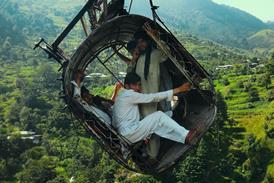After the recent public dissent by members of the jury at Locarno, first time director Irene Bignardi must have been feeling a little let down. But the feeling is well known even for more experienced selectors, such as Venice's Alberto Barbera.
Even before the festival opened, Venice had got a mauling from the local politicos. Once it got going the quality of the films and - equally inevitably - a lack of stars fuelled further criticisms.
Two days before the festival started, a storm of controversy was sparked by remarks from deputy culture minister Vittori Sgarbi who none too helpfully suggested that Venice's entire management team be replaced. Barbera could ride that one out. Sgarbi is known to court controversy and anyway most of the festival structure pre-dates Barbera's reign. But the urbane and charming Barbera was surprised not to have culture minister Guiliano Umbani in attendance on the opening night.
Maybe he had got advanced word about the film. director Milcho Manchevski's widely anticipated second picture Dust was one of the handful of pictures to have been given a near-universal thumbs down by the critics. The festival, which picked the film months ago, has since suggested that the press may be out of step with the public on this one, but the reviews have nevertheless been damning. And it has been enough to make observers wonder if Barbera will be interested in renewing his four-year mandate which expires after next year's event.
Leaving aside the quality of the individual films, the line-up was said to have puzzled many producers as well as festival-goers with its dual competition strands, the traditional art-house line up in Venezia 58 and the more cutting edge, experimental and commercial in Cinema Del Presente. Here Barbera relishes the attention and says that by mixing up the films he has forced the press to cast its eyes wider than the two or three biggest competition titles or those set for imminent local release. "I could not have hoped for better," says Barbera. "All the films have been widely reviewed and analysed."
Similar compacting or blurring of the lines between sections may also be on the cards at other festivals, notably Berlin where incoming director Dieter Kosslick has promised greater co-operation between the Competition and Panorama. Simon Field, chief selector for Rotterdam said: "The bigger the festival and the more adventurous the selection, like Alberto's, the harder it is to get the press to focus on the more experimental sections." Press and publicists were in moaning mood concerning the lack of A-list stars - Nicole Kidman and Denzel Washington were the biggest names to date.
Notably, some of the larger press conferences were not full, with some publicists blaming the low star-wattage for what they perceived to be a smaller number of journalists in attendance. Others said that the press pack had become less international and increasingly Italo-dominated.
But perhaps the best barometer of the event was that deals were thin on the ground with many executives flying off to Toronto and others simply returning home.
In addition to Dust, other films that got frosty receptions included Amos Gitai's Eden and Jill Sprecher's 13 Conversations About One Thing. Richard Linklater's impressionist animation film Waking Life was nothing like as well appreciated as his other picture Tape, which briefly became a must-see item.
The big Italian hope, Guiseppe Piccione's Light Of My Eyes (Luce Dei Miei Occhi) was considered something of a damp squib by the director's normal high standards. And even Woody Allen's Curse Of The Jade Scorpion and David Mamet's Heist failed to blow away the directors' normally receptive Euro-crowd.
Standout movies after six full days of screenings were Alejandro Amenabar's haunted house title The Others, Mira Nair's ensemble piece Monsoon Wedding, Alfonso Cuaron's light and enetertaining Y Tu Mama Tambien, Laurent Cantet's L'Emploi Du Temps and Zhang Yang's Quitting.
Arguably, the two biggest surprises were Antoine Fuqua's Training Day with impressive performances from Denzel Washington and Ethan Hawke and Austrian director Uli Seidel's Dog Days (Hundstage) which at least had the merit of making the audiences react - half strongly positive, half just as strongly negative.
Barbera says he has noticed a levelling out of standards of film-making worldwide: "We used to see US and European films with good production values and films from elsewhere with good stories, but poor quality.
"Today the newer territories have great skills, great production values and interesting approaches to themes and genres. It is not by accident that we have six films from Latin America in the festival. Ultimately what will count more than which section we have placed them in will be the verdicts of the two juries."

















No comments yet